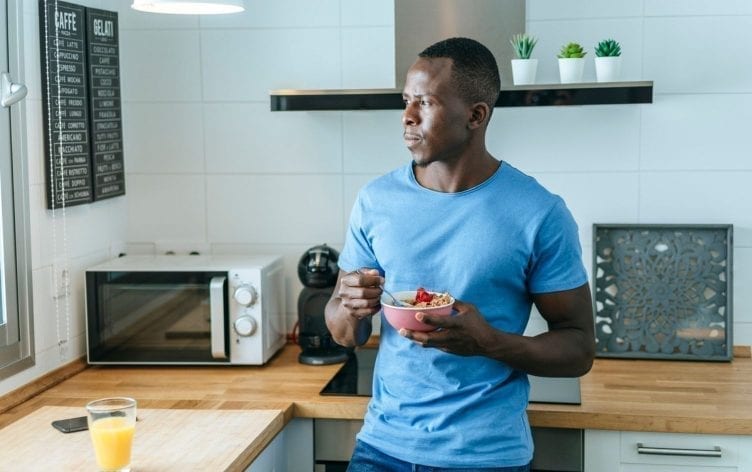If you feel like you’re hearing and seeing information about直觉的和mindful eatingeverywhere, you’re not imagining it. A recent民意调查由国际食品信息委员会基金会(International Fosition Council Foundation)进行的发现,将近三分之一的人有兴趣了解这两个主题。
DISTINGUISHING INTUITIVE AND MINDFUL EATING
为了记录,直观和正念的饮食不是一样的.
- 正念饮食集中在您目前的饮食上 - 最大程度地减少干扰和使用您的感官, 例如。
- 直观饮食是一组独特的原则,可以鼓励人们根据饥饿和饱腹感, stop dieting once and for all and放开有关“好”和“坏食物的想法”.
Experts in these spaces aren’t surprised about the increased interest. “We are all born as mindful and intuitive eaters, but society’s influence teaches us we can’t trust our bodies and we lose the ability to listen to them,” explainsColleen Christensen, RDN.
“我注意到人们想了解更多有关直觉饮食的人有很大的增长。”Emma Nacewicz,具有营养和饮食学学位的认证直觉饮食教练。“我已经看到了它在社交媒体上谈论,我个人在播客,帖子和DMS中的评论中都参与了许多关于此主题的精彩对话。”
为什么对直觉和正念饮食的兴趣增加?
MORE PEOPLE ARE DITCHING DIET CULTURE
Put simply, diet culture is a belief system that promotes weight-loss and thinness. “There is a growing trend toward intuitive eating as more and more consumers become suspicious and critical of diet culture,” says修道院锋利, RD. “We’re seeing a lot more influencers talking aboutbody acceptance,各种大小的健康,正念的饮食和直观的饮食,几年前并未在主流健康文化中真正讨论过所有这些饮食。”在这种情况下,人们正在寻找方法来接近食物和饮食don’t involve strict dieting.
人们对系统性种族主义的认识越来越有助于饮食文化。克里斯滕森说:“饮食文化深深植根于脂肪恐惧症和种族主义。”“我们被教导要以某种方式思考我们的外观,'成功'的外观,'美丽'的样子。”人们越来越质疑现状,时尚饮食和learning to而是采用可持续健康习惯.
THE PANDEMIC CHALLENGED FOOD HABITS
“由于大流行,许多人被迫面对他们与食物的关系正面,这带来了很多压力和焦虑。”克里斯滕森说。她补充说,在处理食物短缺和其他障碍以获取习惯的食物时,人们可能已经意识到自己的饮食习惯是多么僵化。许多人对finding more flexible ways to eat, including branching out withpantry staples和frozen foods. It turns out themiddle of the grocery store can be healthy, 也。
2020将我们的优先事项转移
Dealing with a global pandemic in 2020 also brought changes in what we view as important when it comes to food, notes Alissa Rumsey, MS, RD, author of “Unapologetic Eating: Make Peace with Food and Transform Your Life。”“I’ve had so many people tell me this was the year they realized they were done trying to micromanage their food intake because they want to be able to take this time and energy and spend it on the things and the people that really matter to them.”
它符合关于自我保健的想法
Self-careis certainly a buzzword right now. Because of the pandemic, many of the activities we traditionally view as self-care (Think: going to spin classes or getting a massage) have been taken away, Sharp points out. Because of that, we’ve had to recalibrate and find new ways to take care of ourselves. “The big food trends of 2020 werebanana bread和sourdough而不是像我们平时看到的那样而不是羽衣甘蓝和柠檬水。因此,我认为很多人都在试图寻找方法养活他们的灵魂while grappling with these more challenging times, and intuitive eating fits that narrative,” Sharp explains. In fact, intuitive eating can be considered a form of self-care, Sharp says, since it’s centered on collecting data about how foods make you feel physically and emotionally.
WHAT TO KNOW IF YOU WANT TO GET STARTED
DO YOUR RESEARCH
“我强烈建议您购买直觉饮食的创造者,称为
‘Intuitive Eating: A Revolutionary Anti-Diet Approach’” Nacewicz说。您也可以从myfitnesspalblogabout正念的饮食技术和直觉的eating.
KEEP AN EYE OUT FOR DIET CULTURE IN DISGUISE
直观和正念的饮食现在很流行,这意味着他们被主流所吸引。夏普说:“要批评那些使用直觉饮食来促进减肥或饮食培养的影响者。”“直觉饮食不是减肥饮食。您可能会减肥,可能会增加体重,或者您可能保持不变,但是与您是否进行直观的饮食“正确”无关。
编辑您的社交媒体提要
克里斯滕森说,这是一个简单但重要的一步。她建议,取消关注或静音的帐户无助于您的正念或直观的饮食工作,并用积极的非账户填补您的饲料。
GIVE YOURSELF TIME
It’s OK — and expected — that your shift to a mindful or intuitive approach doesn’t happen overnight. “Learning to eat intuitively, especially after a long period of restriction, is a process,” Sharp says. “You also may not be able to acknowledge or hearyour hunger and fullness cues马上,“听你的身体”不会为您提供足够的卡路里来壮成长。”如果是您的,请签到registered dietitian,专门研究直观的方法。他们可以帮助您提出一个计划,以获取这些线索。
BE OPEN TO THE FEELINGS THAT SURFACE
采用直观或正念的方法将是一段旅程。“这不是线性路径,而是您学会学习的过程sit with the uncomfortable feelings和thoughts that arise,” says Rumsey. ”Rather than trying to ‘fix’ your body, it’s about allowing yourself to reconnect to your body, to sit with the feelings this brings up, and then, in the long run, figure out whathealth and nutritionmean to you in a way that aligns with your values.”
Unlock an experience that’s like having a dietitian, trainer and coach — right at your fingertips.Go Premiumfor expert guidance and exclusive tools that will help you reach your personal health goals.

